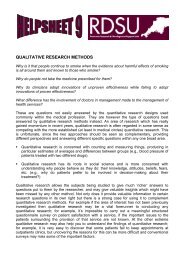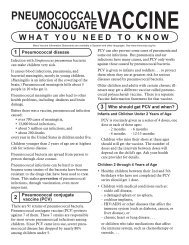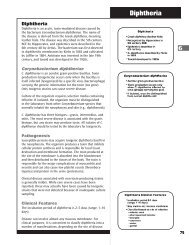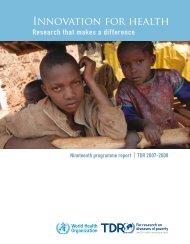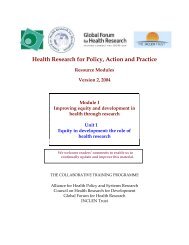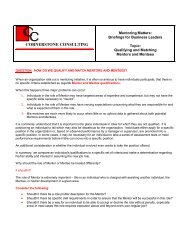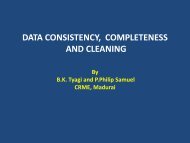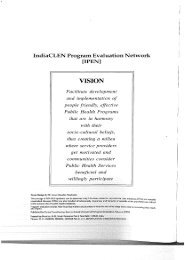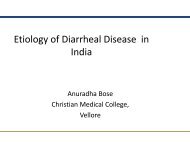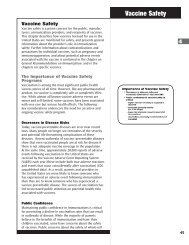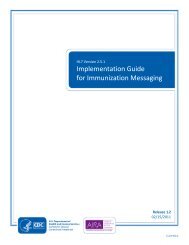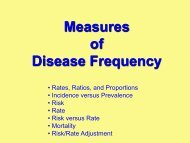Measles, Mumps, and Rubella - Centers for Disease Control and ...
Measles, Mumps, and Rubella - Centers for Disease Control and ...
Measles, Mumps, and Rubella - Centers for Disease Control and ...
Create successful ePaper yourself
Turn your PDF publications into a flip-book with our unique Google optimized e-Paper software.
Vol. 47 / No. RR-8 MMWR 31women, the evidence was limited in scope <strong>and</strong> confined to reports from a single institution(149 ). Several more recently published studies have found no evidence ofincreased risk <strong>for</strong> new onset of chronic arthropathies among women vaccinated withRA 27/3 vaccine (192–194 ). In addition, data from a recent prospective, r<strong>and</strong>omized,placebo-controlled trial by the same group that initially reported chronic arthropathyafter rubella vaccination demonstrated only a small excess risk <strong>for</strong> persistent jointsymptoms among persons who received rubella vaccine (relative risk [RR] = 1.58; 95%confidence interval = 1.01–2.45) (195 ). Neither the duration of arthropathy nor timingof onset was reported. The occurrence of arthropathy described as moderate or severedid not differ between vaccine <strong>and</strong> placebo recipients <strong>and</strong> was rare in bothgroups.Interference with Tuberculin Skin TestsTuberculin testing is not a prerequisite <strong>for</strong> vaccination with MMR or any of its componentvaccines. MMR vaccine may interfere with the response to a tuberculin test(196–198 ). There<strong>for</strong>e, tuberculin testing, if otherwise indicated, can be done either onthe same day MMR vaccine is administered or 4–6 weeks later.RevaccinationNo evidence indicates that administration of live measles, mumps, or rubella vaccineincreases the risk <strong>for</strong> adverse reactions among persons who are already immuneto these diseases as a result of previous vaccination or natural disease. Data indicatethat only persons who are not immune when vaccinated tend to have postvaccinationside effects similar to the disease symptoms (139 ). No evidence exists that personswho have previously received killed mumps vaccine or had mumps disease are atincreased risk <strong>for</strong> local or systemic reactions from receiving live mumps vaccine.Some recipients of inactivated measles vaccine who were later revaccinated with livemeasles vaccines have had adverse reactions to the live vaccine (see Revaccination ofPersons Vaccinated According to Earlier Recommendations).REPORTING ADVERSE EVENTSReporting of serious adverse events that occur after administration of MMR or itscomponent vaccines helps identify adverse events that may be caused by these vaccines.The National Childhood Vaccine Injury Act of 1986 requires health-careproviders to report serious adverse events that occur after vaccination with MMR <strong>and</strong>its component vaccines to the Vaccine Adverse Events Reporting System (VAERS).Persons other than health-care workers can also report adverse events to VAERS.Events that must be reported after MMR vaccination are listed in the reportable eventstable within the Act <strong>and</strong> include anaphylaxis or anaphylactic shock occurring within7 days of vaccination, encephalopathy (or encephalitis) occurring within 7 days of vaccination,<strong>and</strong> any events described in the manufacturer’s package insert ascontraindications to additional doses of vaccine (199 ). Other adverse events occurringafter administration of a vaccine, especially events that are serious or unusual,also should be reported to VAERS, regardless of the provider’s opinion of the causalityof the association. VAERS reporting <strong>for</strong>ms <strong>and</strong> in<strong>for</strong>mation are available 24 hours a



